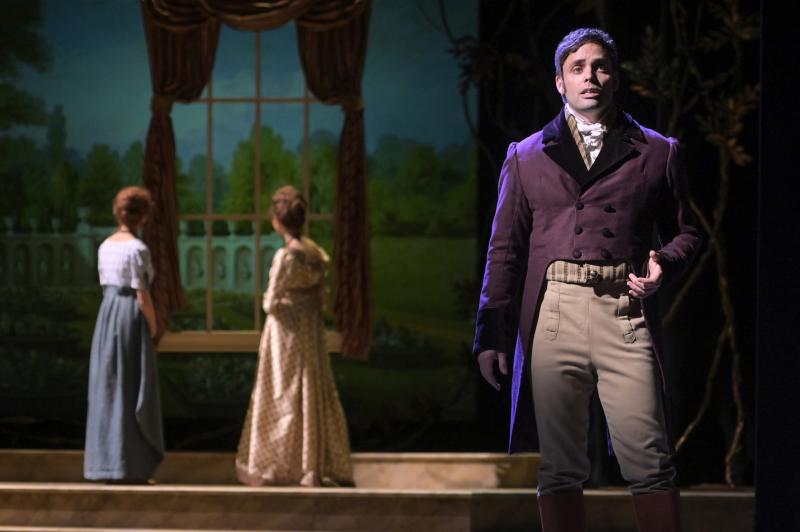Interview: Director Robert Kelley of PRIDE AND PREJUDICE at TheatreWorks Silicon Valley Takes Us Behind the Scenes of the New Musical Now Available for Streaming
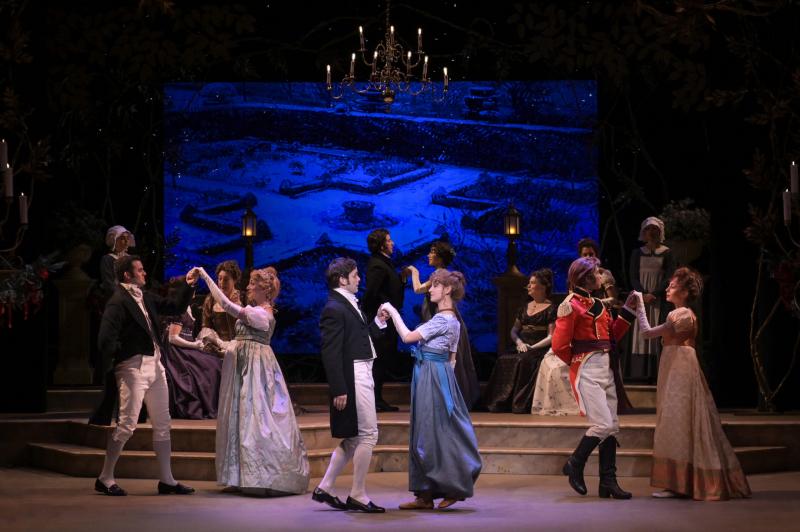
Good news for musical theater lovers! TheatreWorks Silicon Valley's recent, acclaimed production of Paul Gordon's Pride and Prejudice will now be available to stream. Presented by Streaming Musicals, Pride and Prejudice will receive a "virtual opening night" on Friday, April 10 at 3:30pm PT/ 6:30pm ET, with an encore presentation at 7:00pm PT/10:00pm ET. Tony Award winner Beth Leavel (The Drowsy Chaperone, The Prom) and Julie James, Program Director/ Curator of SiriusXM's "On Broadway" channel, will host the "virtual opening night," which will include an intermission discussion with the creative team members including TheatreWorks Silicon Valley's Founding Artistic Director Robert Kelley, who directed the new romantic musical comedy. Streaming during the April 10 "virtual opening night" will be free. Subsequently, Pride and Prejudice will be available to stream for a minimal fee. Digital access and further information can be found at www.prideandprejudicepremiere.com and StreamingMusicals.com.
BroadwayWorld recently caught up with director Robert Kelley to learn more about his production of Pride and Prejudice and also to touch base with him on how TheatreWorks was weathering the current health and economic crisis, even as his astonishing, 50-year tenure as Artistic Director comes to a close. True to form, Kelley remains resolutely upbeat about the future while readily acknowledging the challenges and underlying sadness of the current situation. He is an inveterate believer in the collaborative process of creating new musicals and quick to extol the contributions and talents of his colleagues. The following conversation has been edited for clarity and length.
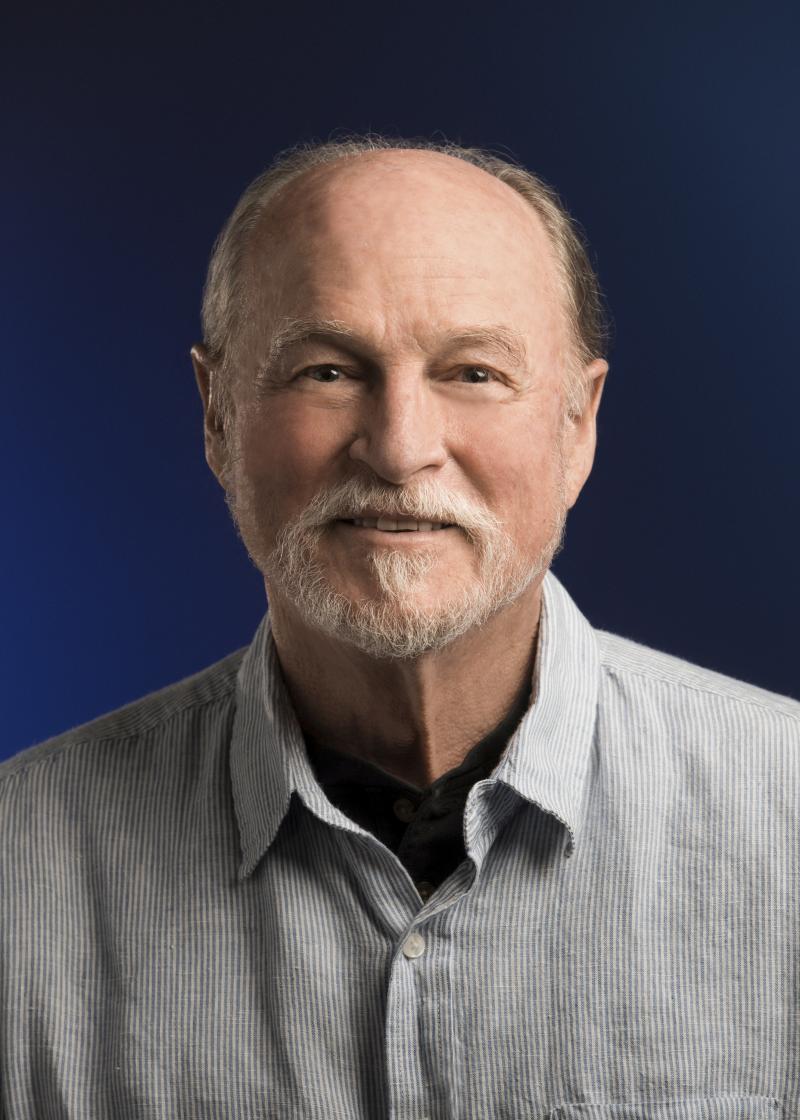
and TheatreWorks Silicon Valley's Founding Artistic Director
I spoke with Paul Gordon back when Pride and Prejudice was still in rehearsal and at that point he was hoping the TheatreWorks production could be filmed and made available for streaming. Was that the plan all along, even before Covid-19 hit?
No, we didn't [originally] have plans to film it. But as the project moved forward, Paul got more and more excited about the production. We just had a great feeling in rehearsal that we were making something different and new, but also faithful to the Austen world. As we went along, Paul started to think "Well, maybe we could record this." He had experience working with Streaming Musicals because he'd done a version of "Emma" with them. He knew where the tools were and the people who knew how to do this kind of thing. The big question was fundraising for it, and Paul was very effective. After doing so many shows here at TheatreWorks, a lot of people know him and really love his work and are extremely supportive. They were able to get it together for this to happen.
When was it actually recorded?
Just before the show closed, over three days. We had a great team of videographers who did a multiple camera shoot that also involved cameras installed in the front row. We had closed off the front row of the theater for this production because the sightlines weren't that good and they put a camera in there, but it was really unobtrusive. I actually haven't seen it yet. I can't wait! [laughs]
So was it filmed in front of a live audience?
Yes. I think that's what distinguishes this kind of recording from the kind of thing you would see maybe on PBS "Theater in America." This is, in fact, a play in production. You're seeing it as if you were sitting in the audience, but you can get up close to people's faces in a way you might not be able to see from the 6th row or whatever. The difference is things like microphones there are concealed usually as much as you can in a live theater production. You do a closeup of that and you see the microphone; it's just inevitable.
I believe this is the 5th Paul Gordon show TheatreWorks has done. What is it about his works that you particularly enjoy?
Well, I think that he is a brilliant composer and an extraordinarily clever lyricist, but I also think his work is both naturally romantic and naturally funny. I have to confess after all these years I'm "coming out" about my love of romance and comedy. [laughs] Certainly there are exceptions. Jane Eyre was the first of his shows we did and it's a darker show, not renowned for its comic chops. [laughs] Paul came to see that show, he was living in Los Angeles at the time, and this was the first production of it outside Broadway. He liked what he saw, we started a friendship right then and there, and one thing led to another. The next one was Emma and that started in our New Works Festival. From then on it was "What do you have that's new?" and off we went.
Certainly he's written other musicals in this time period that we haven't done, but in some cases they didn't quite fit our schedule. Of course, there is Sense and Sensibility which we're doing this coming year that was a commission from Chicago Shakespeare Theater. As soon as I saw it, I was praying we'd someday be able to do it at TheatreWorks. But I'd already convinced Paul to work on Pride and Prejudice which I'd been thinking about doing for years so we wound up doing that before we could get Senses and Sensibility.
The role of the director in developing a new musical is a critical one, and I feel it's often under-appreciated by audiences. I'm thinking of how, say, Stephen Sondheim relied so much on Hal Prince and then James Lapine. Or more recently how Rachel Chavkin took on Hadestown, a song cycle that had been in development for years, and guided it to huge success on Broadway. How do you see the director's role in shepherding a new musical?
I think the director is a part of all the different aspects of a new musical. You need to be a critic and a collaborator and a friend, in some cases encouraging "it's fine, it's great the way it is" or in other cases saying "I know you can do a better version of that song." Putting the whole thing together is actually different than writing it on the page or on the staff of a music sheet. You're looking at the whole and how it's landing. Of course, the writers are very concerned with that as well, but you become a strong voice is trying to put all that together.
Paul and I have a relationship where notes fly back and forth. He can say to me "I don't think that line is working the way we're doing it" and I'll give it a lot of thought and see where we go, and that's the way it was right up to the opening night. We kept feeding back and forth off each other. When you're in this field for a while, I think you come to realize there's really not a way that one point of view can appreciate all possibilities on a stage. You need to get input from everyone, certainly your immediate collaborators like Paul, but also the designers. Perhaps what's especially important is getting feedback from the actors, who are going to be closer to the characters in some ways than you could ever be as the director.
How different is the finished version of Pride and Prejudice from the version that first went into rehearsal last fall?
It went through a lot of changes. There were songs that completely disappeared, songs that moved, that were re-lyric-ed and reused, in some cases sung by a completely different person. Paul did a major revamp of the final, critical scene between Darcy and Lizzie when they realize they are desperately in love with each other and finally admit it. That went through a lot of changes. At one point it was three songs in a row, all in the same scene. By the time we were done, it was one reasonably complicated song that told the story efficiently and yet with a beautiful feel for the romance of the moment. It was a fun scene to stage, but I had to stage it I think three or four different times as we kept changing how it was going. I found that particularly challenging and fun. The whole audience, you can sort of hear them collectively thinking "Kiss the girl! Please, get on with it!" [laughs] so you have to find that level of romantic tension and keep it strong and vibrating until you can't take it anymore and - boom! - they're finally together.
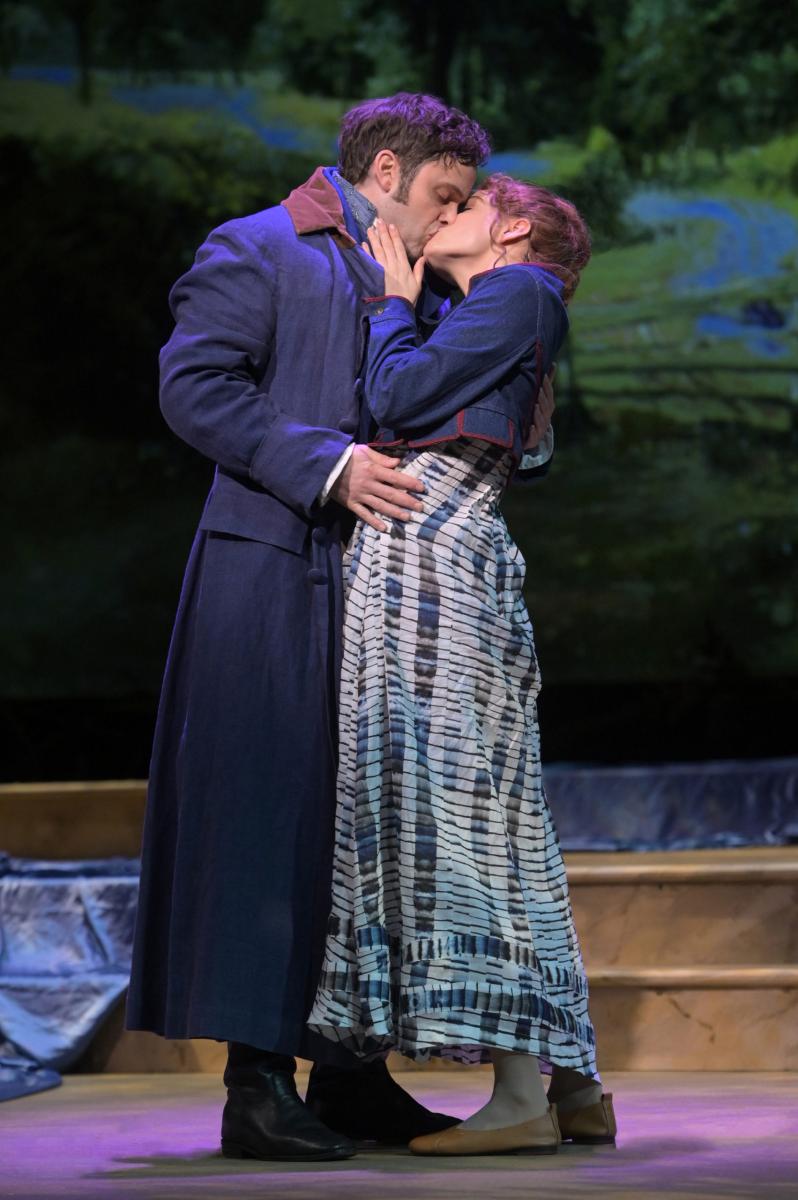
When you're getting the sense that a scene or a song isn't working, how do you know whether it's the writing or the staging or the design that needs to change?
I have to say that's a bit of a hit-and-miss process. I think both Paul and I will have a feeling that a scene isn't working or in some cases that a moment isn't working. Sometimes we both come up with solutions and we sort of over-solve the problem. But I'm always a believer that you can change the staging and it's not necessarily better, it's just different - and that may shake things up enough that you start either finding it or seeing more clearly what is amiss. With Pride and Prejudice, Paul said [of the final sequence] "It's just not working, Kelley. Give me an hour." He went into another room with a piano, came back an hour later and said "Let's try this." And that was the version that we finally ended up going with in that final scene.
I'd talked to him maybe the day after that happened so I'm intrigued to know that the solution he came up with then stayed in the show.
Yes, it did. Then - because it was substantially different, I had to readjust how it was going to look onstage and the actors had to assimilate a different rhythm, in some cases different lyrics, all wrapped around the same basic idea. It turned out in staging it, for me at least, the critical part of that last final romantic scene was how far apart they were. If they were too far apart, somehow it just didn't say that they were desperately wishing to close the gap between them. If they were too close together, it was like "Well, get it over with! Kiss the girl now." [laughs] So it was a back and forth process. We had a representation of a stream between them out in the woods, and finding the moment where he could reach across the stream and she could reach towards him and jump across the stream and eventually into his arms was a very fun and beautiful way of expressing how we finally break down all the barriers to being in love at full speed.
Given that you're such a visual director, how did you work with your design team to create the specific look and feel of Pride and Prejudice.
Well, the team I've been working with on these Jane Austen shows has been pretty much the same throughout. In costumes, a brilliant designer named Fumiko Bielefeldt has done all of our Paul Gordon -Austen shows so I think we have a pretty good idea where we're going. We'll set a year when things are going to happen and she will then do the research. Since almost all of them have been in the 1810 to 1816 time period, there are variations, but that's really when that Regency look is pretty clear. There can be much fancier versions of it because of the families and Jane herself are part of the gentry and they can be very dressed up. On the other hand, Paul writes shows where the actors, especially the leads like Emma or Elizabeth Bennet, are rarely offstage. You can't say suddenly it's six months later, and they're at a ball and they need to be in a completely different set of clothes and shoes and gloves and all of that. We do our best, but when there's only two seconds between scenes, it's mostly on goes a sash and out they go, or the hairstyle gets some kind of jewelry in it and so on.
Joe Ragey has been our scenic designer. He's a brilliant, brilliant designer who's done countless shows at TheatreWorks. We will sit down and work on it and it's really hard, it takes a long time to figure out where we're going. There are a lot of different scenes and places because you're adapting a novel, so the question is how different we want to make these things. Do we put a couple of benches onstage and they serve as everything and it's a single unit? Or do we try to create whole new worlds for each scene? Is there enough time to do that, and how would we go about doing it? But usually I'll walk in and say "Joe, this needs to be the most beautiful set you've ever created."
So - no pressure!
[laughs] So that doesn't help much, but on the other hand it at least sets a starting point to the trail you're gonna go down. And Joe really came through in this case. We decided we wanted to try to create different worlds for each scene, using projections of paintings from the Austen era as a starting point. Then we spent an incredible amount of time discovering all different kinds of paintings - exteriors, interiors, gardens, public houses - that would then in some way influence the scenery. For example, we had one column that we were able to use. They used those a lot in gardens and public squares and things, and we were going to use it in various ways, which we did. One use of it was a beautiful outdoor garden in a very, very wealthy estate and we did find a fantastic painting that had columns in it, but the tops of them weren't exactly the same as the column we were planning to build so - thank you Photoshop! - we just went in and changed this wonderful painting from 200-plus years ago. Suddenly it was like "Whoa, how did they ever do that!" How many people would ever even notice it? Probably just the designer and me, but it was worth the 400 hours we put in to make it happen." [laughs]
The cast includes New York and LA-based actors as well as many local folks. Closest to home, you have TheatreWorks' own Heather Orth, who is delightful as Mrs. Bennet. What was your casting process?
In all of our shows, they are almost entirely Equity professionals, either from the Bay Area or from out of town. We start by casting locally. We have auditions and try to see if we are able to find basically the entire cast in the Bay Area. Among other things, it's very expensive to bring people here from other places in the country and house them in the Silicon Valley. Meanwhile we will have said "Here's a role we are somewhat skeptical we will find [an ideal actor for] here in the Bay Area," after working here for 50 years and knowing the talent pool. So a local audition will be followed by heading off to New York, usually with a couple of local candidates in mind, but not absolutely convinced.
We'll go to New York and see what might be possible, see who's interested there. At the most, it might be three performers or so, and you do two days of auditions. The talent level there is extraordinarily high and we generally have been fortunate to come out with some great, great people. In this case, we found our Lizzie Bennet there and also Mr. Darcy and Wickham - those were very challenging roles to find.
Paul was looking for a particularly challenging vocal range for Mr Darcy. He basically described the part as a rock tenor that had a very high range, but also needed to be an actor capable of pulling off the dark, brooding, handsome Darcy, who eventually has to reveal a very sensitive, romantic, believably lovable side. That was the one I was most going "Omigod, will we find him?!" Justin knocked our socks off in the audition. He was just the ticket we were looking for. Paul was thrilled, and even raised some of the songs a couple of steps. So - we created a role that there probably isn't more than a few people on earth who could sing it the way that it wound up in this show. Sometimes, when we've done a Sondheim show or something, and there's a part and you go "Who the hell could sing that?!" and of course it was designed around a particular singer who had a particular range.
We also brought in Travis Leland, a wonderful performer who played Mr. Bingley. He lives in LA, but is really a Bay Area guy. His career was moved forward very substantially by things he did at TheatreWorks before he went down to LA. He was available and submitted an audition by video and we cast him off that. The rest of the Bennet family were all wonderful local performers, some of whom we knew, a few that we didn't. There was one additional actor, Tara Kostmayer, who played Lydia Bennet. She was in New York, but was also from the South Bay and that's how we knew her. Jeffrey [Lo], our casting director, knew her and got a video from her so it wasn't that we auditioned for her role from New York.
And yeah, people like Heather Orth who works for TheatreWorks as a day job, and brilliantly I might add, is also this extraordinary performer. She first did the reading when we did the show for our New Works Festival and knocked everybody's socks off and therefore wound up in the onstage final version of it and did such an outstanding job. She and Chris Vettel [as Mr. Bennet] were just the perfect couple together. I'd thought "Oh, I've seen all these Pride and Prejudice movies. I don't know if we'll ever be able to find it." And lo and behold, we did the reading and found the perfect couple on our first try.
So that's our cast. They were really wonderful to work with and they really came through. And it's not obvious how challenging it is for actors in a world premiere musical, because you get changes every single day. You could be working a scene, you've memorized it, you've got all the lyrics down, you know the music cold, you know the harmonies and you're in the middle of rehearsing it and then you take a break and say "Well, we're coming back in an hour and working on the scene again." And an hour later Paul shows up with a whole new song and the scene is about 90% sung and so off you go. That's the immense talent that these actors bring, the generosity that they bring to the process. They come in knowing it's going to be an ongoing set of changes and improvements, in some cases a song they loved or a section they loved disappears because it's just not working. Which is not to say that they're not doing it brilliantly, but that the scene is too long and this and that, and they have to adapt.
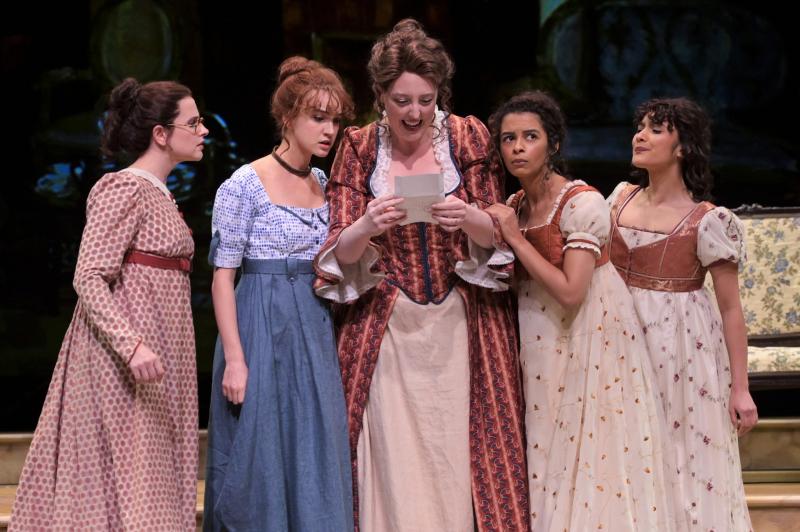
(L to R) Melissa WolfKlain as Mary, Mary Mattison as Elizabeth, Heather Orth as Mrs. Bennet,
Chanel Tilghman as Kitty and Tara Kostmayer as Lydia
Obviously, everyone is struggling these days. In your role as Artistic Director of TheatreWorks, what's been the most challenging thing for you personally?
Well - I think maybe two things. First of all, we had to close one show and stop another. Ragtime was in the process of rehearsal and everybody'd put their hearts and souls into it. Also our shops which were pretty far along in building that show. I'd say that of all the things that have happened in the course of this crisis, the day we did that was the most difficult for me. I had to go in at the start of rehearsal for Ragtime and let this brilliant, wonderful, loving cast know that their work wasn't going to happen, even as we had fortunately decided we would move it a year ahead into the next season so we had at least some moderately good news in the midst of tragic news.
That was very, very difficult and just a few hours later, I was over at the Lucie Stern Theatre where we were performing They Promised Her the Moon to meet that cast. They'd been told by phone, they all came down together with their entire crew to get their belongings, but also to say goodbye to each other. They were obviously close. The cast and the crew, all of them, felt like this wonderful team of theater lovers, theater workers, and most important, theater artists. That was the end of the day and they finally all went out and had a big potluck together. I went home to commiserate.
And of all the parts of that very difficult day, by far the hardest part was telling the four kids, the four young actors in Ragtime that this wasn't going to happen. There were a lot of tears, there was a lot of love coming from the cast, even as they were absorbing the news. It was all that much harder for the younger actors who might not physically, age-wise even resemble the actors they were today a year later.
Yeah, at that age, a year is a long time.
It is a very long time. They might wind up - who knows? - as bass-baritones a year from now for the boys. And the girls might certainly no longer seem to be pre-teenagers. That was really tough.
On an ongoing basis, as we all see our world changing so dramatically every day, I think the challenge as an artistic director has been to keep everyone believing that our art will return and will be every bit as powerful and really every bit as important to the community as it was before all of this happened. Like everybody, we're looking at shows in the future, trying to have a reasonable set of options, sort of if/then, if/then all the way through the next year. I'm sure every theater in the country is trying to come to grips with that. Oregon Shakespeare had to cancel its massive theater project up in Ashland through almost the end of September. They were one of the first to do that.
We are all certainly looking at it and going "What's next?" and it could be a very different world. For us, the options are maybe not as easily dealt with because we do not own the two theaters in which we perform. There are other things booked there, so it's not like you can just move something by a month. I think we've come up with four or five different scenarios that take us through the next season in various ways, but we're going to go with our best shot, realizing if things change over the next several months, the public will certainly understand because everything will be changing for them as well.
Given the myriad difficulties and unknowns you're dealing with, what gives you hope?
Well, I keep seeing our staff on a zoom conference at least once a day, and those conferences are joined by Tim Bond, our incoming Artistic Director. I just love him; he's a fantastic breath of fresh air and new ideas for TheatreWorks. To be perfectly honest, as I sit around and commiserate about all of this, I'm so struck by Tim's positive, optimistic attitude, but also by how tough it is for somebody new to try to come in in the middle of this crisis. I'm going "Oh, my god, what a way to conclude your [tenure]" and then think to myself "Get over it! What a way to start! Tim, what can I do to make life better for you?" [laughs] I think the positive aspect of it is that we've already committed ourselves to a new path and great new leadership. Even though it's going to be hard to start up, I think we're in very good hands.
Along with that, I think people all over the country are experiencing the fact that you can maintain relationships and the love and humor and the commitment that brings people together - online. It's actually possible. The amount of creativity that's been pouring out of everyone at TheatreWorks for what we might do and what we can put online. We now we have Pride and Prejudice, which will be available forever, as a rental, not all that expensive, and that a lot of people are going to see for free on Friday. It is very encouraging that through kind of a stroke of luck we have a professionally created and edited version of one of our shows that's going out there at this particular time and will bring not only the art of Paul Gordon and TheatreWorks, but the brilliance of Jane Austen as interpreted by our cast to people all over the country. So I'm really counting on that, not only as something to be proud of, but something that is going to I hope brighten people's lives everywhere. That's something we have never really had before at TheatreWorks. We've had our Wonderful Productions and great supporters and theater lovers from the Bay Area, but we've never really had something like this that was going to be immortalized. So I'm finding that particularly exciting.
And we're going on with auditions. We're auditioning our shows exclusively by video, we're doing callbacks by video and looking forward to the future. The big question is "When can the future begin?!" [laughs] - you know, from a performing arts point of view and certainly a theater point of view. That imaginary, longed-for date is unknown and may be more complicated than a single date. It might be when can you start and under what circumstances can you start? It's a challenge for everybody.
Thanks for your time today. I personally am very much looking forward to the stream of Pride and Prejudice.
Me, too! Let's hope for the best, and we'll see. [laughs]
(All photos by Kevin Berne)
Streaming of Pride and Prejudice during the April 10 "virtual opening night" will be free. It will then be available on StreamingMusicals.com for $4.99 per rental and $19.99 for purchase. For digital access and more information about streaming Pride and Prejudice, visit www.prideandprejudicepremiere.com and StreamingMusicals.com.
Videos

